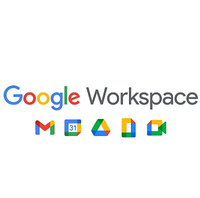Best free office software of 2025
Try something different to Microsoft

We list the best free office software, to make it simple and easy to try something different to Microsoft, but without having to pay for a license.
For most users, Microsoft 365 (formerly known as Microsoft Office and Office 365) remains the original and best office suite. Microsoft Word, Excel, and PowerPoint remain key office apps.
However, over the years other companies have released rival office suites to help with productivity, some of which is paid-for and some of which is free - sometimes with the same company offering both.
All of these alternatives to Microsoft Office offer a similar range of software applications, mainly based on creating and editing documents, spreadsheets, and presentations.
However, while most offer the ability to work with traditional Microsoft Office documents, do be aware that not all will preserve formatting when exporting to or from Microsoft Office, which can be a problem when sending documents between different programs.
Even still, for home users and new businesses, the idea of being able to create, edit, manage, and organize office documents without incurring immediate subscription costs can be very welcome.
Here below we'll list the best free office software apps currently available.
We've also featured the best free software for SMB's.
Google Workspace : Collaboration + productivity apps
There are many different office software suites but Google Workspace formerly known as G Suite remains the original cloud one and one of the best business office suites, offering a huge range of features and functionality that rivals can't match.
Try it free for 14 days.
The best free office software of 2025 in full:
Why you can trust TechRadar
Best free office software overall
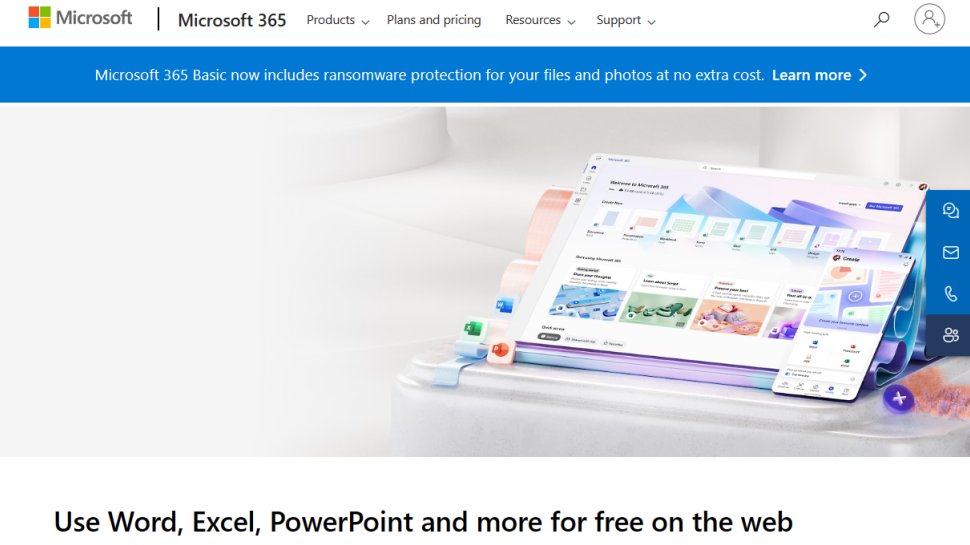
Reasons to buy
Reasons to avoid
Thought you had to pay to use Microsoft Office? Yes, you do, if you want all the full features. But noting the threat from free rivals, especially Google Google Workspace (formerly G Suite) Microsoft has created its own set of free Microsoft Office online apps.
Microsoft 365 Basic looks and works just like its desktop equivalent, and although advanced tools like pivot tables aren't available, though they aren’t offered by Google either.
If you generally use Microsoft document formats, Microsoft 365 Basic is a brilliant choice. Unlike Google's free office suite, it doesn't need to convert your files before you can work on them, and you can share them easily through your Microsoft OneDrive account. Just log in using your Microsoft account (the same one you use to log into Windows 10) and you're ready to go.
There's a version of Microsoft 365 Basic for Chrome, plus mobile editions for iOS and Android.
Read our full Microsoft 365 review.
Best open source free office software
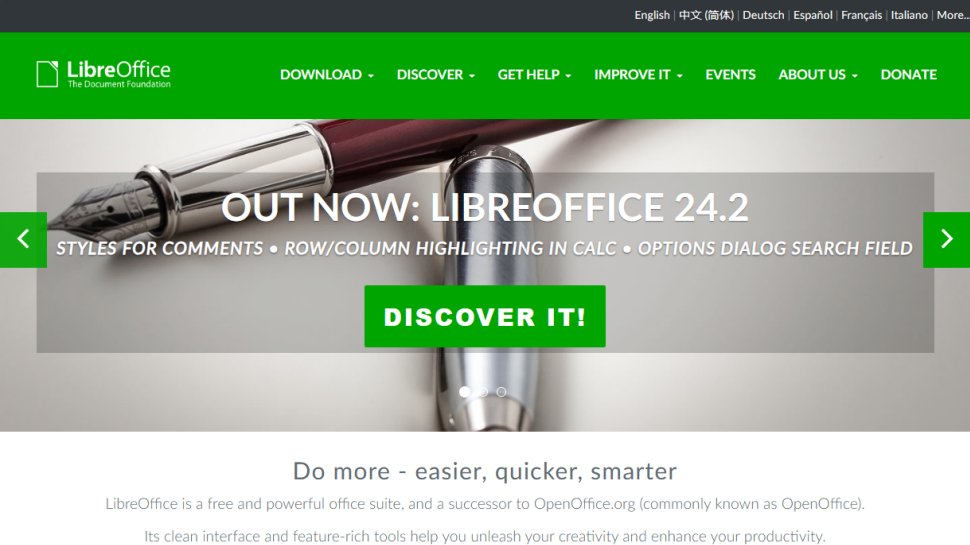
Reasons to buy
LibreOffice is compatible with all Microsoft document formats, and has almost every feature you'll find in the latest versions of Word, PowerPoint and Excel.
The suite contains six programs to cover every common office task: Writer, Calc, Impress, Draw, Math and Base. The last three are tools you won't find in many other free office suites, and are designed for vector diagrams, mathematical functions and databases, respectively. The latter is particularly useful; free alternatives to Microsoft Access are hard to find.
LibreOffice is an open source project maintained by a huge and enthusiastic community of volunteers constantly working to improve stability and add new features. There's a great selection of extensions and templates to make it even more flexible, and it's free for businesses as well as home users.
LibreOffice is a fork of Apache OpenOffice, and the two are extremely similar, but LibreOffice is the better overall product and properly supports file conversion that preserves existing formatting - so your Word .doc files should look the same in LibreOffice as they do in Word, and vice versa.
LibreOffice is available for Windows, Mac and Linux, but there are no official mobile versions available except for a document viewer for Android. It has some editing features, but they're experimental and we wouldn't advise relying on them.
Read our full LibreOffice review.
Best free office software for features
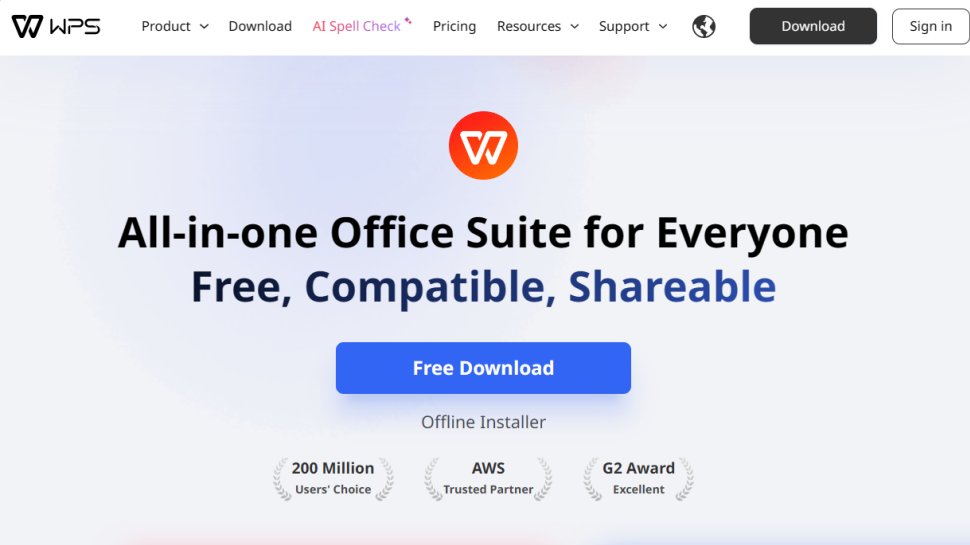
Reasons to buy
Reasons to avoid
WPS Office Free is a slimmed down version of a premium office suite, but you'd hardly know it. Each of its three programs looks just as slick as the latest versions of Word, Excel and PowerPoint, and is packed with just as many features.
File format support is excellent, and you can save your work in native Microsoft formats for easy sharing with Office users. There's no database software, but WPS Office comes with an excellent free PDF reader that's a great replacement for Windows' built-in app.
There's the occasional ad, but these are few and far between. They certainly won't get in the way of your work, and you'll easily forget that everything in this suite is completely free.
There are versions of WPS Office Free for Windows and Linux systems, as well as apps for Android devices, but Apple device users will need to look elsewhere.
Read our full WPS Office Free review.
Best free office software for small business
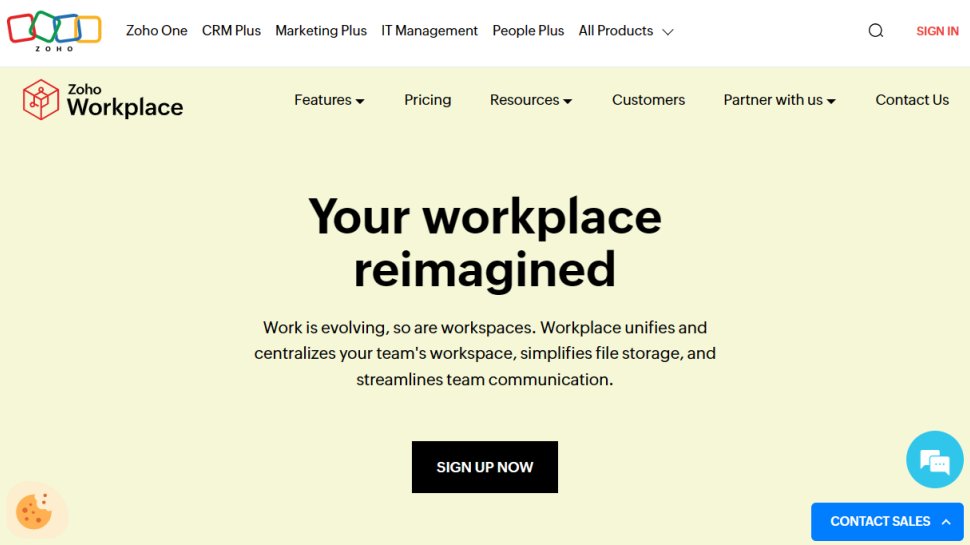
Reasons to buy
Reasons to avoid
Zoho Workplace is very good in its own right. It's certainly closer to a desktop office package, and it's strong enough to have attracted businesses like the BBC and Nike as regular users.
Zoho's new-look word processor (which ditches the classic Word-style interface in favor of a formatting sidebar) is very well-presented and capable of producing professional-looking docs, and it has a sterling spreadsheet and reasonable presentation package alongside it.
They're just the tip of the iceberg, however – Zoho Workplace includes a powerful site creation tool, a file management solution and many collaborative tools. Some are on the simplistic side, so they'll likely not replace anything you might already have in place, but if you're starting out as a small business Zoho is probably a good jumping-off point.
If you want to signup for the free version of Zoho Workplace you need to search the pricing page for the "Forever free" plan. However, there's no one-click set up or access, and instead you have to go through a sign up process that begins by providing details of an existing business domain.
Read our full Zoho Workplace review.
Best cross-platform free office software
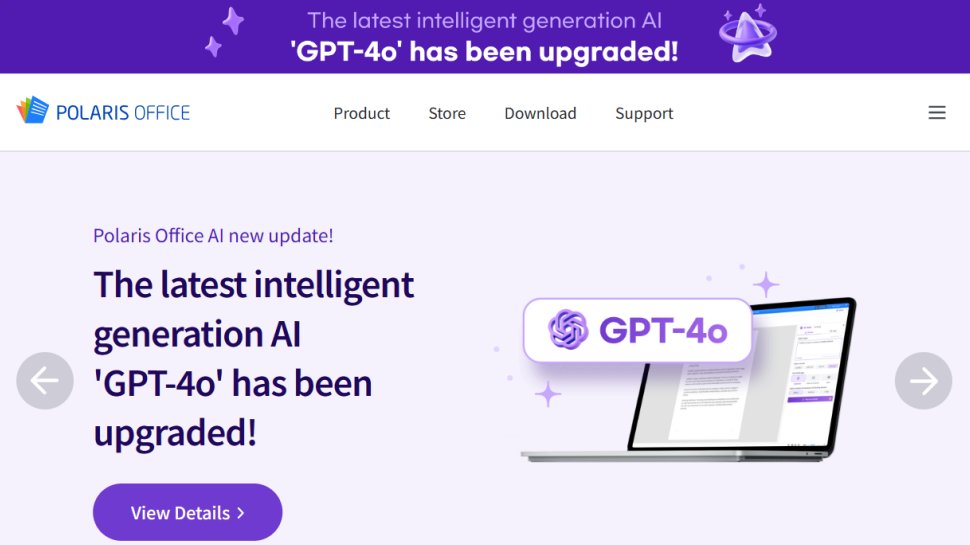
Reasons to buy
Reasons to avoid
If you own a Samsung phone, you might already be familiar with the mobile version of Polaris Office. This cross-platform free office software is available for Windows, macOS, Android and iOS, and comes pre-installed on some Samsung handsets. It’s compatible with all Microsoft document formats, and offers a slick ribbon-based interface with some basic customization options.
Take care if you choose to install Windows version, you’ll see various additional pieces of bundled software, which could potentially include a browser extension from McAfee called WebAdvisor, a market research tool called PremierOpinion, and antivirus software. You can decline all of these – just keep an eye out.
You’ll then need to sign in with Facebook or Google, or create an account. This is necessary because Polaris Office is a cloud-based service. Your free Polaris account comes with 60MB monthly data transfer, 1GB cloud storage, and can be used across three devices (one desktop and two mobile). If that’s not enough space, you can connect Polaris Office to Google Drive, Dropbox, Box, Microsoft OneDrive and Amazon Cloud Drive – or save work locally to your device.
Upgrading to a premium Polaris account gives you access to extra features including a PDF editor, removes ads, and the ability to search within a document.
Read our full Polaris Office review.
Best free office software for collaboration
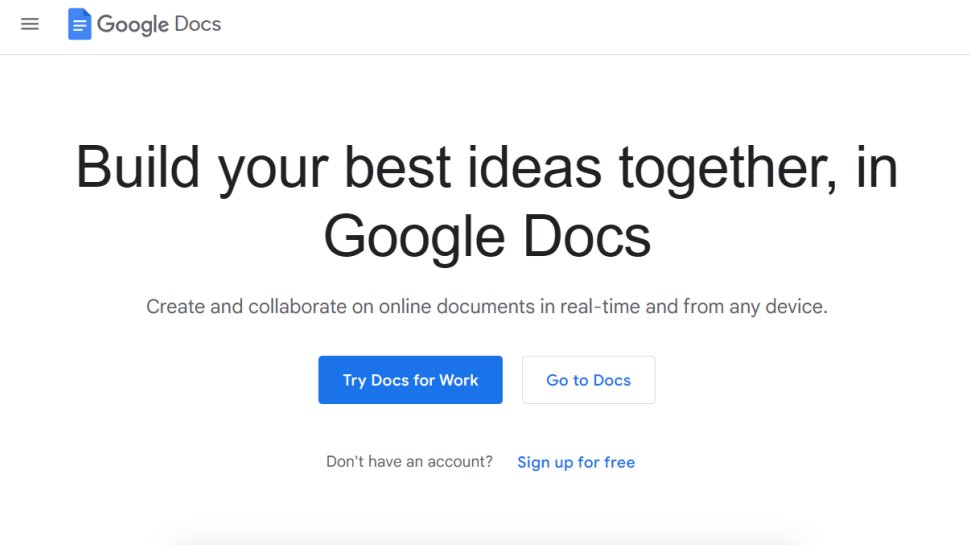
Reasons to buy
Reasons to avoid
If you work collaboratively, or switch between a PC and a Mac, Google Docs, Sheets and Slides could be your first port of call.
For anyone who's already deep into the Android/Google ecosystem, this suite will be a natural choice. The three key tools run happily in any web browser, and are available as mobile apps for Apple and Android devices.
Google's free office suite doesn't offer the advanced tools you'll find in desktop software like LibreOffice (there are no pivot tables, for example, and there's no database tool) but everything is laid out in a clear, logical way and all your files will be saved and synced automatically so you don't have to worry about transfers and backups.
The chief disadvantage of Docs, Sheets and Slides is that opening files created using other office software is a cumbersome process and file formatting isn't is always converted properly. This is partly because Google's office tools use web fonts rather than ones stored locally on your device, and partly because Google doesn't support some of the features built into Microsoft software.
Additionally, there are some quirks with Google Docs that make it less user-friendly than other office software. As free software it does the job fine, but as a paid product it still lags far behind the features and functionality of Microsoft 365.
Read our full Google Docs review.
Best free office software for conversions
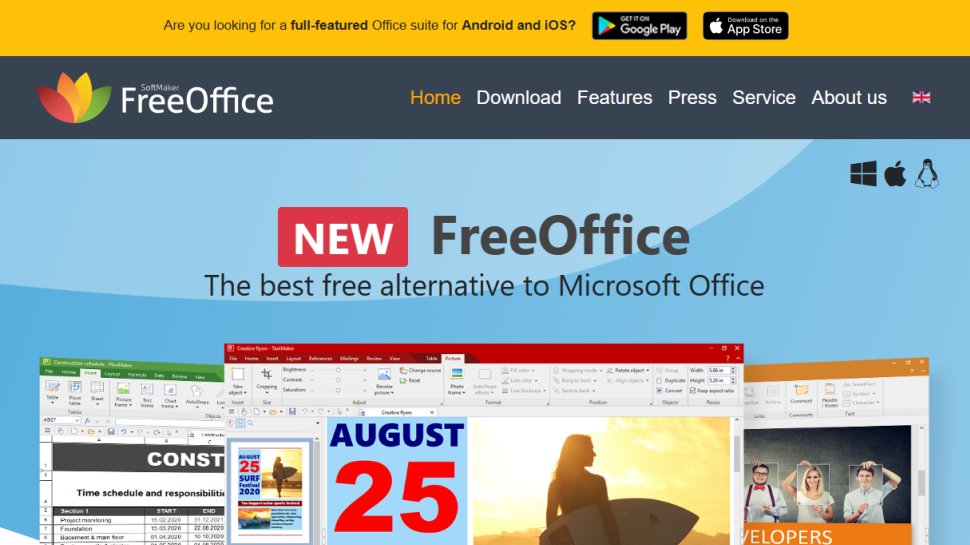
Reasons to buy
Reasons to avoid
Like WPS Office Free, SoftMaker FreeOffice provides analogs for Microsoft Word, Excel and PowerPoint (TextMaker, PlanMaker and Presentations respectively).
As with all the free office suites in this roundup, there's support for Microsoft file formats from 1997 onwards. It also offers effortless conversion to both PDF and Epub formats, which is a welcome addition.
Unfortunately, some key features are exclusive to the premium version of the software. Some of these (like tabbed browsing) are nice to have but non-essential, but the lack of a thesaurus is a real drawback for anyone who writes on a regular basis.
FreeOffice doesn't look quite as smart as WPS Office, but if you dislike the Microsoft ribbon and find it unintuitive then you'll prefer the slightly more old fashioned approach to navigation.
Read our full FreeOffice review.
We've also featured the best document editing and management software.
Best free office software FAQs
Which free office software is best for you?
When deciding which free office software to download and use, first consider what your actual needs are, as sometimes free platforms will only give you access to a basic set of tools, so you may find a paid subscription is much more worthwhile. Additionally, budget software options can sometimes prove limited when it comes to the variety of tools available, while higher-end software can really cater for every need, so do ensure you have a good idea of which features you think you may need.
How we tested the best free office software
To test for the best free office software we first set up an account with the relevant software platform, whether as a download or as an online service. We then tested the service to see how the office software could be used for different purposes and in different situations, such as syncing between devices and backing up to the cloud. We also looked at import/export features, as well as different user tools that might be expected in any office software platform, from basic to advanced, to see how well they functioned.
Read more on how we test, rate, and review products on TechRadar.
Get in touch
- Want to find out about commercial or marketing opportunities? Click here
- Out of date info, errors, complaints or broken links? Give us a nudge
- Got a suggestion for a product or service provider? Message us directly
- You've reached the end of the page. Jump back up to the top ^
Are you a pro? Subscribe to our newsletter
Sign up to the TechRadar Pro newsletter to get all the top news, opinion, features and guidance your business needs to succeed!
Brian has over 30 years publishing experience as a writer and editor across a range of computing, technology, and marketing titles. He has been interviewed multiple times for the BBC and been a speaker at international conferences. His specialty on techradar is Software as a Service (SaaS) applications, covering everything from office suites to IT service tools. He is also a science fiction and fantasy author, published as Brian G Turner.
